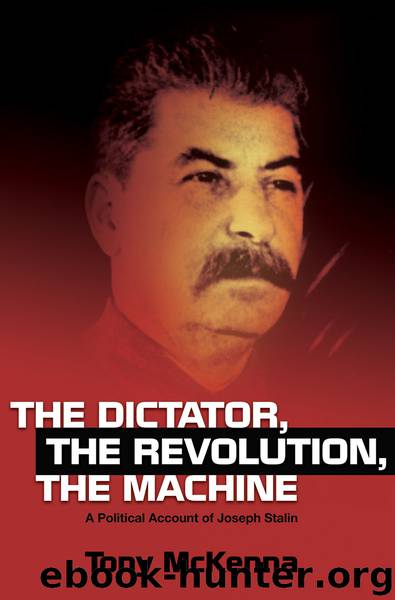The Dictator, the Revolution, the Machine by Tony McKenna

Author:Tony McKenna
Language: eng
Format: epub
Publisher: Sussex Academic Press
Published: 2016-07-28T16:00:00+00:00
Conclusion
I wrote this biography of Stalin – and this account of Stalinism – in the second half of 2015. For those on the left, 2015 was an interesting year, politically speaking, for all sorts of reasons, but two in particular stick in mind. First was the train of events taking place in Greece. Greece – a country which had been heavily hit by the global financial crisis of 2007–8 – had seen as a consequence a vivid social polarization occur between an elite and an increasingly poverty-stricken majority. It was this majority who were bearing the brunt of the austerity measures imposed on the nation by a Greek government in collusion with an international “troika” consisting of the European Commission, the European Central Bank, and the International Monetary Fund. Greece was not alone in this, of course. Governments across the board had done an effective job of imposing neoliberal austerity measures on their populations in the context of what was perhaps the single biggest crisis of the global market in history. Most audaciously of all, they pressed ahead with these measures – which attacked social welfare and hurt the very poorest in society – while at the same time effecting the biggest transfer of wealth in human history to the upper echelons: to the system of banking and high finance – that is, the very system whose deregulation had allowed for the rapacious and unbridled cycle of speculation which had brought the banking system to its knees, and precipitated the crash in the first place. It was, quipped one commentator, a vast expropriation of wealth on the part of the state which constituted nothing less than an act of socialism – only it was a “socialism for the rich”.254 In the same period the international left proved itself woefully incapable of meeting the ideological challenge. Isolated, fragmented, more often than not its organizations descended into internecine conflict fomented by sectarian bitterness, as in one country after the next, governments assured their populations in wistful, sorrowful tones that there simply was no alternative; they would have to cough up and pay the bankers’ bill. When the left might well have hoped to find its feet, to create an effective anti-austerity narrative which would have pulled into its vortex millions of people, instead its forces remained marginalized and on the periphery, by and large condemned to sit back and watch.
All of which makes what happened in Greece particularly incredible. Perhaps because the level of debt repayment – or “restructuring” as the IMF so euphemistically describe it – was particularly extortionate especially given the relatively small size of the Greek economy; but in any event the misery the population was made to endure was profound and swiftly translated into breadlines, mass suicides, brutal police repression and a significant increase in militancy and political activity on the part of the public. Greece saw the rise of Golden Dawn, a fascist party which began to poll heavily in the parliament and infiltrate the police –
Download
This site does not store any files on its server. We only index and link to content provided by other sites. Please contact the content providers to delete copyright contents if any and email us, we'll remove relevant links or contents immediately.
Fanny Burney by Claire Harman(26582)
Empire of the Sikhs by Patwant Singh(23062)
Out of India by Michael Foss(16837)
Leonardo da Vinci by Walter Isaacson(13292)
Small Great Things by Jodi Picoult(7101)
The Six Wives Of Henry VIII (WOMEN IN HISTORY) by Fraser Antonia(5488)
The Wind in My Hair by Masih Alinejad(5070)
A Higher Loyalty: Truth, Lies, and Leadership by James Comey(4937)
The Crown by Robert Lacey(4791)
The Lonely City by Olivia Laing(4787)
Millionaire: The Philanderer, Gambler, and Duelist Who Invented Modern Finance by Janet Gleeson(4448)
The Iron Duke by The Iron Duke(4337)
Papillon (English) by Henri Charrière(4238)
Sticky Fingers by Joe Hagan(4172)
Joan of Arc by Mary Gordon(4080)
Alive: The Story of the Andes Survivors by Piers Paul Read(4010)
Stalin by Stephen Kotkin(3940)
Aleister Crowley: The Biography by Tobias Churton(3622)
Ants Among Elephants by Sujatha Gidla(3450)
